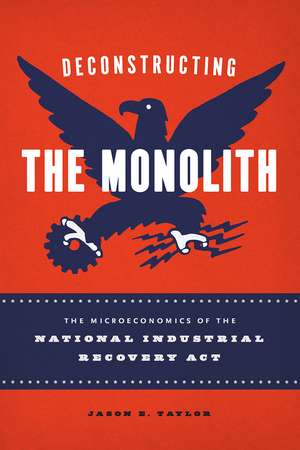Deconstructing the Monolith: The Microeconomics of the National Industrial Recovery Act: Markets and Governments in Economic History
Autor Jason E. Tayloren Limba Engleză Hardback – 8 apr 2019
The National Industrial Recovery Act (NIRA) was enacted by Congress in June of 1933 to assist the nation’s recovery during the Great Depression. Its passage ushered in a unique experiment in US economic history: under the NIRA, the federal government explicitly supported, and in some cases enforced, alliances within industries. Antitrust laws were suspended, and companies were required to agree upon industry-level “codes of fair competition” that regulated wages and hours and could implement anti-competitive provisions such as those fixing prices, establishing production quotas, and imposing restrictions on new productive capacity.
The NIRA is generally viewed as a monolithic program, its dramatic and sweeping effects best measurable through a macroeconomic lens. In this pioneering book, however, Jason E. Taylor examines the act instead using microeconomic tools, probing the uneven implementation of the act’s codes and the radical heterogeneity of its impact across industries and time. Deconstructing the Monolith employs a mixture of archival and empirical research to enrich our understanding of how the program affected the behavior and well-being of workers and firms during the two years NIRA existed as well as in the period immediately following its demise.
The NIRA is generally viewed as a monolithic program, its dramatic and sweeping effects best measurable through a macroeconomic lens. In this pioneering book, however, Jason E. Taylor examines the act instead using microeconomic tools, probing the uneven implementation of the act’s codes and the radical heterogeneity of its impact across industries and time. Deconstructing the Monolith employs a mixture of archival and empirical research to enrich our understanding of how the program affected the behavior and well-being of workers and firms during the two years NIRA existed as well as in the period immediately following its demise.
Preț: 315.36 lei
Preț vechi: 398.31 lei
-21% Nou
Puncte Express: 473
Preț estimativ în valută:
60.36€ • 65.59$ • 50.74£
60.36€ • 65.59$ • 50.74£
Carte indisponibilă temporar
Doresc să fiu notificat când acest titlu va fi disponibil:
Se trimite...
Preluare comenzi: 021 569.72.76
Specificații
ISBN-13: 9780226603308
ISBN-10: 022660330X
Pagini: 224
Ilustrații: 17 halftones, 13 line drawings, 17 tables
Dimensiuni: 152 x 229 x 23 mm
Greutate: 0.45 kg
Ediția:First Edition
Editura: University of Chicago Press
Colecția University of Chicago Press
Seria Markets and Governments in Economic History
ISBN-10: 022660330X
Pagini: 224
Ilustrații: 17 halftones, 13 line drawings, 17 tables
Dimensiuni: 152 x 229 x 23 mm
Greutate: 0.45 kg
Ediția:First Edition
Editura: University of Chicago Press
Colecția University of Chicago Press
Seria Markets and Governments in Economic History
Notă biografică
Jason E. Taylor is the Jerry and Felicia Campbell Chair Professor of Economics at Central Michigan University.
Cuprins
Preface
1 Introduction
2 The Underpinnings, Precursors, and Development of the NIRA
3 The NIRA Code Negotiation Process
4 The President’s Reemployment Agreement of August 1933
5 Codes of Fair Competition: Industrial Planning and Collusion under the NIRA
6 The NIRA Compliance Mechanism in Theory and Practice
7 The Economics of Compliance and Enforcement and the NRA Compliance Crisis
8 The Schechter Decision and the Lingering Effects of the NIRA
9 Conclusion
Acknowledgments
Notes
References
Index
1 Introduction
2 The Underpinnings, Precursors, and Development of the NIRA
3 The NIRA Code Negotiation Process
4 The President’s Reemployment Agreement of August 1933
5 Codes of Fair Competition: Industrial Planning and Collusion under the NIRA
6 The NIRA Compliance Mechanism in Theory and Practice
7 The Economics of Compliance and Enforcement and the NRA Compliance Crisis
8 The Schechter Decision and the Lingering Effects of the NIRA
9 Conclusion
Acknowledgments
Notes
References
Index
Recenzii
“Jason Taylor has meticulously detailed the largely neglected enormity of the National Industrial Recovery Act regulatory regime. He shows that behind its flawed macroeconomic objectives were a plethora of wage, hours, pricing, and output-restraining arrangements varying widely between industries. This book is truly a tour de force combining traditional historical scholarship with shrewd economic analysis.”
“Taylor delivers a fresh perspective on one of the most unusual episodes in American economic history. Taking advantage of a variety of new data sources and recent studies, he drills down to the microeconomic level to tease apart the effects of the NIRA on employment, collusion, and many other outcomes. Anyone interested in work sharing, cartels, or the Great Depression more broadly can benefit from this comprehensive study.”
“Taylor provides new insights into the operation of the National Industrial Recovery Act, encouraging us to explore its differential adoption and impact in different industries. His approach validates the desirability of moving away from a purely macroeconomic understanding of this important Depression-era legislation.”
“A bold attempt on the part of the Roosevelt Administration to end the Great Depression, the National Industrial Recovery Act is viewed by many as a cause of both the depth and duration of the Great Depression. In this timely work, Taylor delves into the nuts and bolts of the legislation, focusing the key policy instrument, namely, the hundreds of codes of fair competition, which he shows had uneven effects on wages and employment. A must-read for all those with an interest in the Great Depression.”








